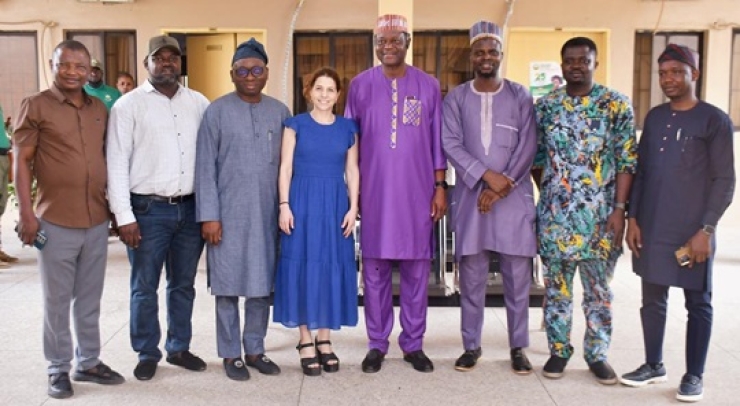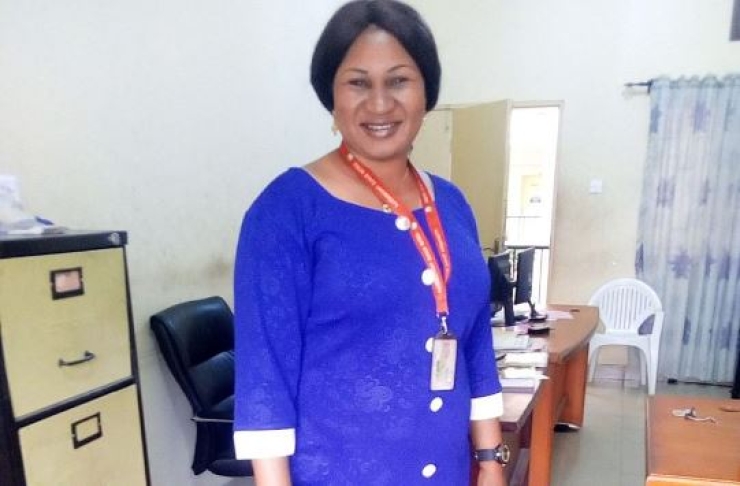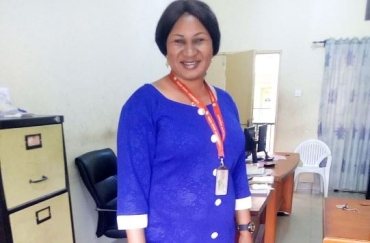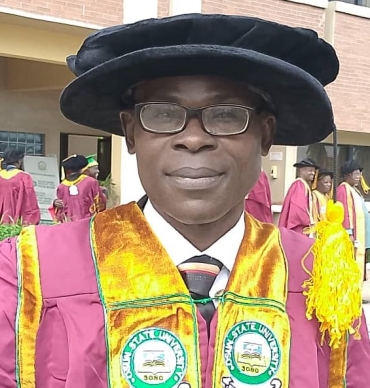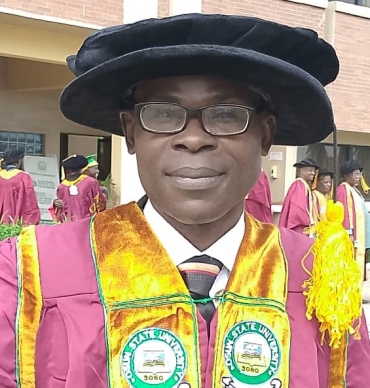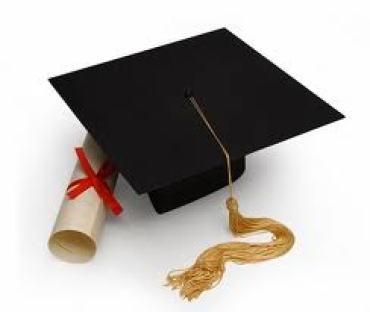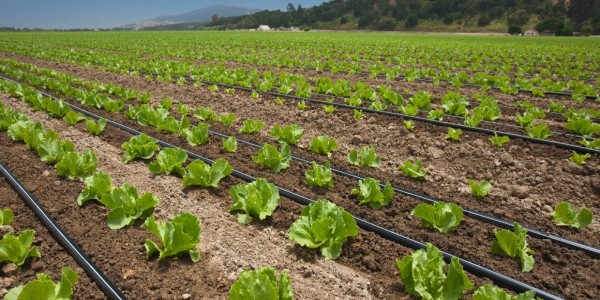The Vice President of EndFund, Kimberly Kamara, and the Senior Associate, Programmes, Mr. Moses Aderogba, on Monday, March 10, 2025, paid a working visit to the Vice-Chancellor of Osun State University (UNIOSUN) to inspect the institution’s research facilities and assess the progress of scientists working on grants awarded by the global philanthropic organization.
Osun State University continues to receive global recognition as one of the University’s senior confidential secretaries, Mrs. Titilayo Eniola Fayemi, has been selected for a fully funded training programme at the English and Foreign Languages University, Hyderabad, India.
Osun State University continues to receive global recognition as one of the University’s senior confidential secretaries, Mrs. Titilayo Eniola Fayemi, has been selected for a fully funded training programme at the English and Foreign Languages University, Hyderabad, India.
In a remarkable recognition of academic excellence, the Nigerian Army has selected Dr. Adesola Adesote, an Associate Professor in the Department of History and International Studies at Osun State University (UNIOSUN), to join a prestigious research team tasked with documenting the life and legacy of the late Chief of Army Staff, Lieutenant General Taoreed Abiodun Lagbaja, CFR, NAM.
In a remarkable recognition of academic excellence, the Nigerian Army has selected Dr. Adesola Adesote, an Associate Professor in the Department of History and International Studies at Osun State University (UNIOSUN), to join a prestigious research team tasked with documenting the life and legacy of the late Chief of Army Staff, Lieutenant General Taoreed Abiodun Lagbaja, CFR, NAM.
This is to inform all freshers and transfer students who have completed their online registration that the 2024/2025 Matriculation Numbers are now available. Check and Print your Matriculation Number now!
This is to inform all freshers and transfer students who have completed their online registration that the 2024/2025 Matriculation Numbers are now available. Check and Print your Matriculation Number now!
 |
OSUN STATE UNIVERSITY, P.M.B 4494, OSOGBO NIGERIA |
CALENDAR FOR 2024/2025 ACADEMIC SESSION
November, 2024
Monday, 18th Resumption for 2024/2025 Academic Session & Commencement of Harmattan Semester Lectures for Fresh and Returning Students
December, 2024
Monday, 16th -Wed 18th Orientation for Fresh Students
Friday, 20th Matriculation
Monday, 23rd Dec. 2024-Sunday, 5th Jan. 2025 Christmas/New Year Break
January, 2025
Monday, 6th Resumption from Christmas/New Year Break
February, 2025
Friday, 21st End of Lectures
Monday, 24th - Friday, 28th Lecture Free Week
March, 2025
Monday, 3rd March, Fri. 21st March Harmattan Semester Examinations (All Levels)
Monday, 17th – Friday, 21st GNS Examinations
Monday, 31st March - Friday, 11th April Semester Break
April, 2025
Monday, 24th -Fri. 11th April Marking and grading of Script
Monday, 21st Resumption for 2024/2025 Rain Semester & Commencement of Lectures
July, 2025
Friday, 18th July End of Lectures
Monday, 21st - Friday 25th Lecture Free Week
Monday, 28th - Friday, 8thAugust Rain Semester Examinations (All Levels)
August, 2025
Monday, 11th - Friday, 15th GNS Examinations
Monday, 18th - Fri, 15th Marking and Grading of Scripts/
End of 2024/2025 Academic Session
Monday, 25th Commencement of Annual Leave for Academic Staff
September, 2025
Thursday, 25th- Saturday, 27th 15th Convocation Ceremonies
November, 2025
Friday, 7th End of Annual Leave for Academic Staff
Monday 10th Resumption for 2025/2026 Academic Session
The final Admission list of Osun State University for the 2024/2025 Admission exercise into the newly approved degree programmes has been released. Prospective candidates who participated in the Admission screening exercise can check their admission status via the Undergraduate Admissions portal.
The final Admission list of Osun State University for the 2024/2025 Admission exercise into the newly approved degree programmes has been released. Prospective candidates who participated in the Admission screening exercise can check their admission status via the Undergraduate Admissions portal.
More...
The supplementary UTME list II of the 2024/2025 Admission exercise into various degree programmes have been released. Prospective candidates who participated in the Admission screening exercise can check their admission status via the Undergraduate Admissions portal.
Fellowship of Academic and Professional Bodies / Academic Distinctions
- Fellow, Nigerian Academy of Letters (Since August 2017)
- Fellow, Historical Society of Nigeria (Since September 2011)
Membership of International Board of Trustees/ Advisory Boards Since 1999
- Member, Advisory Board, UoB-UNIOSUN-ERC (Since 2024)
- Member, Advisor and Administrative Board, US Based Historical Africa Cultural Center, 2020. A non-profit organization, dedicated to promoting and exhibiting ancient African Traditions, Arts & Crafts, Music and Culture (Since 2020)
- Member, Board of Trustees of Institute of African Culture and International Understanding, a UNESCO Category II Institute, Olusegun Obasanjo Presidential Library OOPL, Abeokuta, Ogun State (2021 till date).
- Member, Board of Trustees of the Centre for Black Culture and International Understanding, a UNESCO Category II Institute, Osogbo, Osun State (2021 till date)
- Member of the International Board of Trustees of the University of Birmingham (U.K)/ European Research Council based Programme: Knowing Each Other: everyday religious encounters, social identities and tolerance in southwest Nigeria. The Board of Trustees headed by the renowned Prof. J.D.Y. Peel, also includes such eminent historians as Prof. Toyin Falola FHSN, Prof. Karin Barber FBA, Prof. Tom Mccaskie and Prof. Sola Akinrinade FHSN. (2013-2018).
- Member of the International Board of Trustees of Lagos State University Centre for Democracy and Development Studies (CDDS)- a Ford Foundation Initiative (1999-2003).
RESEARCH GRANTS: GRANTS NATIONAL AND INTERNATIONAL
1. Principal Investigator / Lead Researcher N45 Million
Research granted by the Centre for Black Culture and
International Understanding- Protecting the Past for the
Future: Safeguarding Intangible Cultural Heritage in
Armed Conflicts Zones of Africa (2023) N45,000,000:00
- NASFAT Research Grant, Towards a National
History of NASFAT @ 25, (2020) N25,000,000:00
- Principal Investigator / Lead Researcher, Oyo History
Project Aug. 2021 till date N50,000,000:00
- Principal Investigator / Lead Researcher, Ile-Ife Oral History
Project 2023 till date N50,000,000:00
- Team Leader, Ford Foundation Grant (2002) for the Establishment
of Centre for Development and Democratic Studies at
Lagos State University, Ojo USD 300,000.00
- Chief S. L. Edu Research Grant, 1996 for S.L. Edu
Family History Project N30,000,000:00
- Mobil-Exxon Grant for the provision of
E-Component of Fatiu Akesode Library (2001) N10,000,000.00
- Sir Michael Otedola Research Grant, 2005 for the
the study of the History and Culture of the Peoples of
Epe Division of Lagos State N1,200,000.00
- Femi Okunnu Research Grant (2013): Change and
Development in Nigeria: The Role of the Ansa-ud-Deen
Society of Nigeria N5,000,000.00
RESEARCH GRANTS AT THE LAGOS STATE UNIVERSITY, NIGERIA (1990-2005)
- Lagos State University Senate Research Grant for the study
of the Nigerian Civil War, 1990 N750,000.00
- Lagos State University Senate Research Grant for the study of the
History of the Peoples of Lagos State, 2003 N1,450,000.00
- Lagos State University Senate Research Grant for the study
of The Growth of Islam in Lagos State, 2005 N820,000.00
- Research Grant from the Centre for Development and
Democratic Studies, 2005 N1,750,000.00
International Travel Grants Since 2006
- Travel Grant by the Centre for Black Culture and International Understanding to attend the Intergovernmental Committee for Safeguarding of the Intangible Cultural Heritage at Rabat, Morocco, November 28 – December 3, 2022
- Travel Grant by the Centre for Black Culture and International Understanding to attend the UNESCO Ninth Session of the General Assembly of the States' Parties to the Convention for the Safeguarding of the Intangible Cultural Heritage, which is taking place at the UNESCO Headquarters, Paris, France, July 2022
- Travel Grant by the Centre for Black Culture and International Understanding to attend the UNESCO 14th Session of the Intergovernmental Committee on Intangible Cultural Heritage at Bogota, Columbia, December 8-14, 2019
- Travel Grant by the Centre for Black Culture and International Understanding to attend the UNESCO 13th Session of the Intergovernmental Committee on Intangible Cultural Heritage at Port Louis, Mauritius, November 26 – December 1, 2018
- Travel Grant by the Centre for Black Culture and International Understanding to visit Iwalewahaus, University of Bayreuth, Germany, July 21 –July 27, 2018
- Travel Grant by the University of Birmingham and European Research Council for participation at the 58th Annual Meeting of the African Studies Association (ASA), at Sheraton San Diego Hotel and Marina, San Diego, CA, USA, November 19-22, 2015.
- Travel Grant by the University of Birmingham and European Research Council for participation at the 57th Annual Meeting of the African Studies Association (ASA) 20-23, November, 2014.
- Travel Grant by the University of Birmingham and European Research Council for participation at the Crossroad in African Studies Conference, University of Birmingham, September 3-6, 2013
- Travel Grant by the Centre for Black African Arts and Civilization (CBAAC) to attend the International Conference on Multi-Culturalism and the Prospects for Africa and Africa Diaspora Development at the State University of Bahia, Salvdor de Bahia, Brazil, November, 2011.
- Travel Grant by the Government of Osun State to attend the preparatory Workshop on the organization of World Summit of Mayors, International Conference, Salvador de Bahia, Brazil, 2010.
- Travel Grant by the Government of Osun State to attend the preparatory workshop on the organization Global Conference of Black Nationalities, Atlanta, Georgia, 2009.
- Travel Grant by the Federal Ministry of Information and Centre for Black and African Arts and Civilization (CBAAC) to attend the CBAAC Conference at the State University of Rio de Janeiro, Brazil, 9-16 November, 2008.
- Travel Grant by the Federal Government of Nigeria to attend the 2nd International Conference of Intellectuals from Africa and Diaspora (CIAD2), held at the Convention Centre/Federal University of Bahia, Salvador, Brazil, September, 2006.
 |
OSUN STATE UNIVERSITY, P.M.B 4494, OSOGBO NIGERIA |
CALENDAR FOR 2024/2025 ACADEMIC SESSION
November, 2024
Monday, 18th Resumption for 2024/2025 Academic Session & Commencement of Harmattan Semester Lectures for Fresh and Returning Students
December, 2024
Monday, 16th -Wed 18th Orientation for Fresh Students
Thursday, 19th Matriculation
Monday, 23rd Dec. 2024-Sunday, 5th Jan. 2025 Christmas/New Year Break
January, 2025
Monday, 13th Resumption from Christmas/New Year Break
February, 2025
Friday, 21st End of Lectures
Monday, 24th - Friday, 28th Lecture Free Week
March, 2025
Monday, 3rd March, Fri. 21st March Harmattan Semester Examinations (All Levels)
Monday, 17th – Friday, 21st GNS Examinations
Monday, 31st March - Friday, 11th April Semester Break
April, 2025
Monday, 24th -Fri. 11th April Marking and grading of Script
Monday, 21st Resumption for 2024/2025 Rain Semester & Commencement of Lectures
July, 2025
Friday, 18th July End of Lectures
Monday, 21st - Friday 25th Lecture Free Week
Monday, 28th - Friday, 8thAugust Rain Semester Examinations (All Levels)
August, 2025
Monday, 11th - Friday, 15th GNS Examinations
Monday, 18th - Fri, 15th Marking and Grading of Scripts/
End of 2024/2025 Academic Session
Monday, 25th Commencement of Annual Leave for Academic Staff
September, 2025
Thursday, 25th- Saturday, 27th 15th Convocation Ceremonies
November, 2025
Friday, 7th End of Annual Leave for Academic Staff
Monday 10th Resumption for 2025/2026 Academic Session
 |
OSUN STATE UNIVERSITY, P.M.B 4494, OSOGBO NIGERIA |
CALENDAR FOR 2024/2025 ACADEMIC SESSION
November, 2024
Monday, 18th Resumption for 2024/2025 Academic Session & Commencement of Harmattan Semester Lectures for Fresh and Returning Students
December, 2024
Monday, 16th -Wed 18th Orientation for Fresh Students
Thursday, 19th Matriculation
Monday, 23rd Dec. 2024-Sunday, 5th Jan. 2025 Christmas/New Year Break
January, 2025
Monday, 13th Resumption from Christmas/New Year Break
February, 2025
Friday, 21st End of Lectures
Monday, 24th - Friday, 28th Lecture Free Week
March, 2025
Monday, 3rd March, Fri. 21st March Harmattan Semester Examinations (All Levels)
Monday, 17th – Friday, 21st GNS Examinations
Monday, 31st March - Friday, 11th April Semester Break
April, 2025
Monday, 24th -Fri. 11th April Marking and grading of Script
Monday, 21st Resumption for 2024/2025 Rain Semester & Commencement of Lectures
July, 2025
Friday, 18th July End of Lectures
Monday, 21st - Friday 25th Lecture Free Week
Monday, 28th - Friday, 8thAugust Rain Semester Examinations (All Levels)
August, 2025
Monday, 11th - Friday, 15th GNS Examinations
Monday, 18th - Fri, 15th Marking and Grading of Scripts/
End of 2024/2025 Academic Session
Monday, 25th Commencement of Annual Leave for Academic Staff
September, 2025
Thursday, 25th- Saturday, 27th 15th Convocation Ceremonies
November, 2025
Friday, 7th End of Annual Leave for Academic Staff
Monday 10th Resumption for 2025/2026 Academic Session

